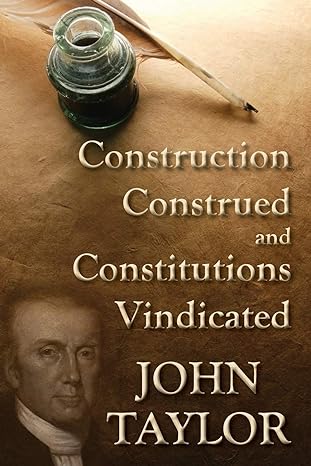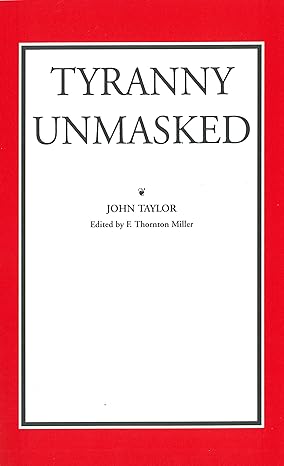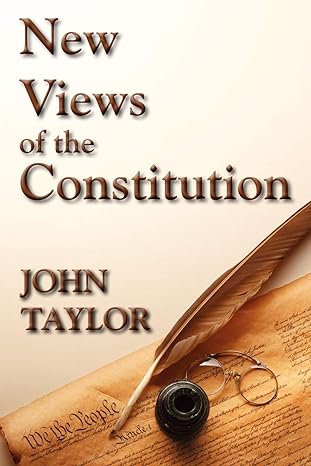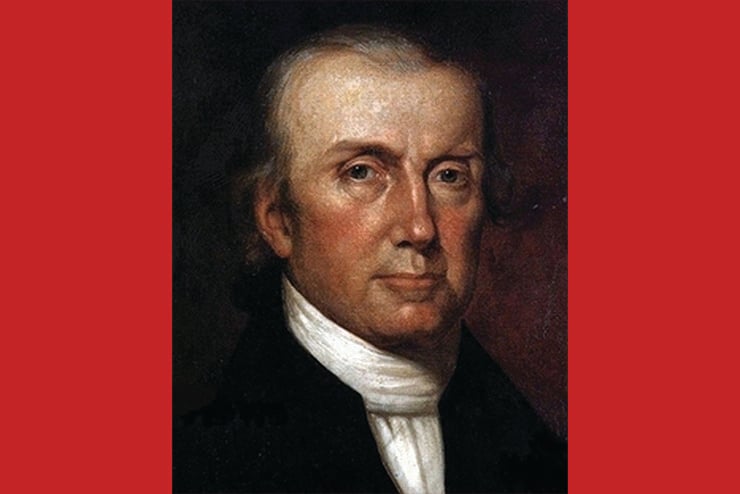Prophet of Encroaching Tyranny
John Taylor of Caroline was a man of the American Revolution. During the fight for independence, he served in the Continental Army and Virginia militia. He left the latter at the end of the war with the rank of lieutenant-colonel. Military life molded his character as it did for so many other men, but the enduring influence on Taylor was not the campaigns of the Continental Army; it was the Spirit of 1776, which gave the Revolution form and substance. The 13 colonies, Taylor realized, were preexisting political communities that owed no allegiance to a foreign government. Virginia, Massachusetts, and the other states had the same claim to govern their own affairs as did England or France. Self-government was the North Star of the Revolution and remained Taylor’s political Polaris throughout his life.
Taylor was born in 1753 in Caroline County, Virginia. His father died in 1758, and his mother sent young John to live with his uncle Edmund Pendleton, a lawyer who would become a leading figure in Virginia politics and eventually serve as president of the state’s Court of Appeals. Pendleton and the boy bonded because Pendleton had lost his own father before his birth and had been raised by a kindhearted planter as his apprentice. Remembering the grace that had been shown him, Pendleton ensured that Taylor received a good education at boarding school and at the College of William and Mary. After college, Taylor studied law in Pendleton’s office and was admitted to the bar in 1774. The war interrupted Taylor’s practice, but after the end of hostilities he excelled in the legal profession.
The practice of law was profitable for Taylor and allowed him to earn substantial fees, which he used to purchase land. Agriculture became his passion, and he left the practice of law as soon as possible. Throughout his life as a planter, Taylor experimented with scientific farming. He shared his knowledge with others through his book Arator (Latin for “Plowman”) and welcomed visits from farmers seeking to learn how to restore depleted soil. Taylor’s genius was not limited to agricultural pursuits but appeared also in his study of republicanism and constitutional structures.
During the ratification controversy, Taylor opposed the Constitution of 1787 and instead preferred a revision of the Articles of Confederation. A pure confederal system, in Taylor’s view, best supported the idea of local self-government that was at the core of the Revolution. The issue of ratification placed him and Pendleton in different political camps; however, Taylor did not actively participate in the ratification battles of 1787-88 because his law practice demanded his full attention.
In 1793, out of respect for his republican principles, the Virginia legislature appointed him to the United States Senate. From this vantage point, Taylor observed a push by Alexander Hamilton and his allies to establish a puissant central government. This was incongruent with the promises made by the Constitution that the new government’s powers would be few and defined and would apply mostly to foreign affairs and foreign commerce.
The efforts by Taylor and other Southerners to oppose Hamiltonian measures, and their retaliation against British insults to American commerce, created a split with Northerners that threatened to dissolve the nascent nation. Massachusetts Senator Rufus King and Connecticut Senator Oliver Ellsworth approached Taylor to discuss dissolving the union. New England depended on Great Britain for credit and commerce, and the Southerners’ pro-French foreign policy in the early 1790s and insistence on a small-scale general government vexed the New Englanders. King and Ellsworth believed that the interests of the two sections were diametrically opposed and that peaceful dissolution would be in the best interests of both parties.
Taylor left the conversation convinced that New England Federalists cared more about mercantile wealth than the republicanism of the Revolution. The encounter also cemented his view that the Federalists, to borrow terms from British political discourse, were a “court” party, ever seeking to expand the ambit of the new government, while Republicans were a “country” party, ever on guard against the slightest hint of corruption or usurpation of power.
After a short stint in the U.S. Senate, the citizens of Caroline County elected Taylor to the Virginia House of Delegates in 1796. In these years, tensions between Jeffersonian Republicans and Federalists increased during the crisis of the Alien and Sedition Acts. Prompted by the quasi-war with France, the Acts broadly interpreted the Constitution in order to vest President John Adams with dictatorial powers over aliens, and to make criticism of the federal government a crime. Previous efforts to expand federal power appeared mild compared to the alien and sedition laws.
As Jefferson and Madison prepared their Kentucky and Virginia Resolutions of 1798 and contemplated how to achieve success in the 1800 election, Taylor favored a structural change in the Constitution. Protests and a rotation of elected officials could accomplish only so much. Taylor believed that the states should have an explicit right to expound the Constitution. Thus, in the case of the Sedition Act, Virginia could declare such a blatant violation of the First Amendment unconstitutional and prevent enforcement in its territory. Taylor was a mover of Madison’s Virginia Resolutions that advocated interposition, but Taylor believed that more substantial efforts were necessary.
After Jefferson’s election to the presidency in the so-called Revolution of 1800, Taylor continued to demand constitutional change. Indeed, his mentor, Pendleton, agreed with Taylor about fundamental alterations and wrote an essay for the Richmond Examiner titled “Danger Not Over.” In essence, Pendleton (undoubtedly after close consultation with Taylor) urged Republicans not to be content with one of their own occupying the White House. He called for a clear definition of the spheres of the federal and state governments and warned about monied interests seeking bounties for their advancement at the expense of the people and the states.
During the first Jefferson administration, Taylor filled an unexpired Senate term in 1803. Except for a short return to the Senate in 1822, Taylor eschewed holding office and focused on his plantation, Hazelwood, and political writings. It is these writings that have had lasting impact.

In his book Construction Construed and Constitutions Vindicated (1820), Taylor masterfully diagnosed the ills of the American political system. Taylor argued that the constitutional difficulties facing the people and the states resulted from the reemergence of a European view that government possessed absolute sovereignty. Taylor pointed to the American Revolution and averred that “the divine sovereignty claimed by governments of every form, was completely exploded or reclaimed by” the people of the several states. A principal-agent relationship was established where the people occupied the superior position of principal and government acted as an accountable agent.
Popular sovereignty for Taylor was the “primary principle of our whole political system, which our governments both feel and profess.” Popular sovereignty also birthed the idea of the people delegating a limited and defined set of powers to government. Only a principal can engage an agent and set boundaries for the agent’s actions.
In the context of the federal government, Taylor challenged those who claimed that the amalgamated people of the United States had created the Constitution of 1787. If the American people had created the Constitution, Taylor mused, then why did statesmen refer to the Constitution as forming a union? “The term ‘union,’” Taylor explained, “has never been applied to describe a government, established by the consent of individuals; nor do any of our state constitutions use it in that sense.” The American union, Taylor wrote, “was the act of distinct bodies politick, composed of the people within different geographical boundaries, and not a number of people, encircled by one line, without any such discrimination.” The locus of ultimate power was critical to Taylor because it impacted the right of construction.
Taylor denied that “the executive, legislative or judicial departments of the state or federal governments have ever consented to the union” and therefore “no one of these departments can have an exclusive right of construing” the Constitution. The people of the states, however, in separate conventions did consent and thus possessed ultimate authority to interpret it. The obvious implication of Taylor’s logic was that the Supreme Court—as a branch of the federal government and not a party to the constitutional compact—could not be the final arbiter of the Constitution.
Of course, Taylor believed that the Court did have a role in interpreting the Constitution, but that role was limited to cases or controversies between individuals. In claiming the authority to settle jurisdictional disputes between the federal and state governments, the Court usurped the place of the people of the several states. Taylor observed that the Philadelphia Convention rejected a congressional veto over state legislation and therefore it would make no sense to claim that the Framers silently revived such a power for the judicial branch. In making claims of judicial supremacy, Taylor believed that Chief Justice John Marshall attempted to revive the role of the British Parliament and vest a branch of government with ultimate sovereignty.

In his book Tyranny Unmasked (1822), Taylor focused upon a dangerous trend in American politics. “By our political theory,” Taylor wrote, “the people are supposed to be the patrons of the government, and not the government the patron of the people.” When patron status becomes reversed, an actual tyranny arises as government “prescribes constitutional regulations to the people” and “use[s] their property in donations to individuals or combinations.”
At the heart of constitutional controversies, Taylor believed, was a thirst for power to enact legislation “for the purpose of transferring property from the people to patronized individuals or combinations.” Such was the motivation for the Bank of the United States, internal improvement legislation, and protective tariffs. Loose construction, therefore, was but a tool for extending government power for enriching the favored few.
Taylor inveighed against “capitalists” but did not use the term in the modern or Marxian sense. Taylor had no problem with private ownership of agricultural or manufacturing means of production. The capitalist was to Taylor a man focused solely on personal profit at the expense of his fellow citizens. (Think of our modern globalist elite, who are happy to outsource good-paying manufacturing jobs while their countrymen suffer unemployment or flip burgers for minimum wage.) He had no ill will for the New England factory owner but objected to the idea that Southern consumers should pay a “tax” on European manufactured goods to boost the New Englander’s bottom line.
Economic concerns aside, Taylor opposed measures such as the protective tariff because it undermined the equality of states. Some states were enriched by it and others impoverished. The union was supposed to be an equal partnership. Measures that transferred wealth from one state to another were inimical to the common ground of the constitutional compact.
The Missouri question arose in the final years of Taylor’s life. He lamented the divisions developing over an issue that “was definitively disposed of by the federal compact.” Taylor viewed slavery as a matter left to the internal self-government of the states and averred that it was “a fraud to open it again.” He was not surprised that those injecting turmoil into national politics were also the same persons who supported a national bank, protective tariffs, a federal pension list, and other endeavors outside of Congress’s enumerated powers.
Taylor accused the agitators who had resurrected the issue of slavery of establishing “two great combinations of states” resulting in “the baleful idea of a geographical balance of power.” The result, Taylor feared, would menace the peace and happiness of the union. He expected division between the sections to grow and the slaveholding states to resort to a natural right of self-defense to halt interference with domestic institutions. Along with Jefferson, he heard the fire bell in the night and would not have been surprised by the events that led to the Civil War.

In Taylor’s final book, New Views of the Constitution (1823), he pleaded with Americans to realize that “the happiness and prosperity of the United States will be greater under a federal than a national government.” Forces favoring consolidation had interpreted the Constitution in a reckless manner to achieve certain policy results. In effect, they treated the federal government “as the sole heir of the states, as the concentrated power of America, and as a political almighty.” Too often “restrictions are converted to enlargement, and exceptions into a general rule.” The Constitution, Taylor averred, should be interpreted as a federal instrument and not a consolidated instrument.
If he could examine our modern government, Taylor would conclude that we had abandoned the principles of the American Revolution and mimicked the British model, in which ultimate sovereignty rests in Parliament. He would declare our government a tyranny because it dictates fundamental law and distributes vast amounts of wealth to favored industries and classes. But he would also point us to a way back: a federal system in which the federal government undertakes few and defined matters and the several states are left to govern their internal affairs.

Leave a Reply